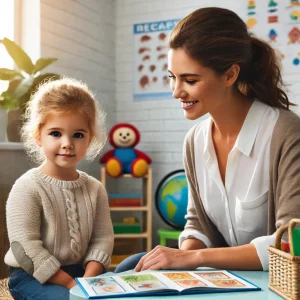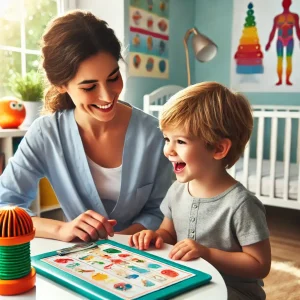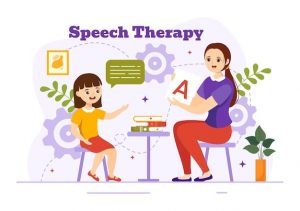Unlocking Potential: How OT Empowers Kids to Thrive
By Prapoorna M
Last Updated: March 4, 2024
Welcome to the world of Occupational Therapy (OT) for kids, a journey where every step matters in nurturing the unique potential of each child. As a parent, guardian, or caregiver, understanding the intricate landscape of a child’s development is crucial. You might have heard of Occupational Therapy and wondered, “Is this something my child needs?” We’re here to guide you through this vital question.
Occupational Therapy is more than a treatment; it’s a pathway to independence, confidence, and joy for children facing developmental hurdles. Whether it’s the fine motor skills needed to tie shoelaces, the sensory processing abilities to handle a noisy classroom, or the social skills to make friends, OT addresses a broad spectrum of developmental needs. It’s about giving children the tools they need to thrive in their daily lives.
Understanding Occupational Therapy for Kids
Occupational Therapy (OT) might sound complex, but at its heart, it’s about helping children master the everyday skills that many of us take for granted. Think of it as a bridge that connects a child with the skills they need for daily activities – from tying shoes to playing with friends. OT is not just about physical development; it encompasses the whole person, addressing physical, mental, and social well-being.
Read about The Speech Chain.
Key Signs Your Child Might Need Occupational Therapy
Identifying the need for Occupational Therapy in your child can be challenging. Here’s a checklist to help you recognize some of the common signs. Remember, every child is different, and these are just general guidelines.
Developmental Delays:
- Does your child struggle with basic self-care tasks like dressing or feeding themselves?
- Are they lagging behind in reaching age-appropriate developmental milestones?
Also Read to know more about on Early Identification/ Warning Signs in child development.
Fine and Gross Motor Skills Challenges:
- Is your child having difficulty with tasks requiring fine motor skills, like holding a pencil or using scissors?
- Do they seem less coordinated than their peers in activities like running or jumping?
Learn more about motor developmental difficulties in children with autism
Sensory Processing Issues:
- Does your child overreact or underreact to sensory experiences like touch, sound, or sight?
- Are they unusually sensitive to textures in food or clothing?
Explore our home-based occupational therapy activities for sensory play
Social and Emotional Development:
- Does your child struggle with making friends or playing with other children?
- Are they facing challenges in understanding and expressing emotions?
Understand the Importance of emotional and mental health in children under five.
Cognitive and Communication Skills:
- Is your child having difficulty following instructions or understanding tasks?
- Do they find it hard to communicate their needs or understand others?
Occupational Therapy at Different Ages
Understanding the necessity of Occupational Therapy (OT) for various age groups can provide a clearer picture of how it supports child development. Here’s a breakdown of what OT might look like at different stages of your child’s growth:
OT for 2-Year-Olds
- Developmental Milestones: Look for progress in walking, using hands for play, and beginning to use utensils.
- Key Focus: Enhancing motor skill development, addressing sensory processing issues, and assisting with feeding and behavioral challenges.
- When to Consider OT: If your two-year-old struggles with basic motor skills, reacts unusually to sensory stimuli, or faces challenges with feeding and behavior.
Discover more about pediatric therapy and milestone
OT for 3-Year-Olds
- Developmental Milestones: Developing fine motor skills like holding a pencil, basic self-care like dressing, and engaging in more complex play.
- Key Focus: Improving fine and gross motor skills, sensory processing, social interactions, and self-care skills.
- When to Consider OT: If your child has difficulty with coordination or sensory processing or struggles with social and self-help skills,
OT for 4-Year-Olds
- Developmental Milestones: Refining motor skills for pre-writing, developing school readiness skills, and enhancing social interactions.
- Key Focus: Focusing on fine motor skills, sensory integration, and preparing for school-related activities.
- When to Consider OT: If there are challenges in pre-writing skills, sensory processing, or difficulty in adapting to structured learning environments.
OT for 5-Year-Olds
- Developmental Milestones: Enhancing attention and concentration, developing emotional regulation, and refining organizational skills.
- Key Focus: Building executive functioning skills, improving visual perception, and supporting emotional and sensory development.
- When to Consider OT: If your child struggles with attention, emotional responses, or organizational skills as they approach school age.
OT Goals and Strategies by Age
| Age Group | Developmental Goals | OT Strategies |
|---|---|---|
| 2-Year-Olds | • Mastering basic motor skills (walking, using hands) • Beginning sensory processing (reaction to textures, sounds) • Initial social interactions and emotional responses | • Sensory play to improve tolerance to different textures and sounds • Activities to enhance fine and gross motor skills, like stacking blocks • Encouraging play-based interactions to develop social skills |
| 3-Year-Olds | • Refining motor skills (holding a pencil, dressing) • Developing self-care routines • Enhancing play and social engagement | • Fine motor skill activities, like drawing or using scissors • Guided self-care practices (dressing, grooming) • Structured play activities to foster social skills and cooperation |
| 4-Year-Olds | • Preparing for school (pre-writing skills, social adaptation) • Advancing sensory processing abilities • Developing emotional regulation | • Handwriting readiness exercises • Sensory integration activities for classroom settings • Role-play and storytelling to understand and manage emotions |
| 5-Year-Olds | • Enhancing attention and concentration for school tasks • Building organizational skills • Improving complex social interactions and emotional understanding | • Concentration and attention-focused activities, like puzzles • Organizational skill-building tasks (sorting, planning activities) • Group activities and discussions to deepen social and emotional skills |
At Wellness Hub, we tailor our OT programs to match these developmental stages, ensuring your child receives the support they need at the right time. Our experienced therapists use a variety of techniques and activities designed specifically for each age group, fostering a nurturing and effective therapy environment.
The Role of Occupational Therapy in Addressing Specific Challenges
Occupational Therapy plays a crucial role in helping children overcome various developmental challenges. Here’s how OT can make a difference:
- Fine and Gross Motor Skills: OT helps in refining skills like holding utensils, writing, and playing sports, which are vital for everyday tasks and academic success.
- Sensory Processing Issues: Therapists work with children who are overly sensitive or unresponsive to sensory stimuli, helping them to better process and respond to their environment.
- Social and Emotional Development: OT assists children in developing social skills necessary for making friends, understanding emotions, and functioning in group settings.
Learn about Enhancing Kids Writing: Key Fine Motor Skills Development
The Occupational Therapy Process – Evaluation to Intervention
The journey of Occupational Therapy (OT) begins with a thorough evaluation, a crucial step in understanding your child’s unique needs. Here’s how this process unfolds:
- Initial Assessment: This is where occupational therapists start by gathering comprehensive information about your child. They look into various aspects such as your child’s developmental history, their current skill levels, and daily activities. This could include observations, standardized tests, and discussions with you, the parent.
- Identifying Specific Needs: The therapist then pinpoints the specific areas where your child might need support. This could range from fine motor skills, such as holding a pencil, to sensory processing skills, like coping with loud noises.
- Goal Setting: Together with you and your child, the therapist sets achievable goals. These goals are personalized and could be anything from improving handwriting skills to better-managing emotions in social settings.
- Developing an Intervention Plan: Based on these goals, a tailored intervention plan is created. This plan is a roadmap to your child’s progress, involving specific activities and therapies designed to meet their unique needs.
Learn about the role of speech therapists in online settings and how they contribute to the OT process.
Enhancing Your Child’s Life with Occupational Therapy
The impact of Occupational Therapy on a child’s life can be transformative. Here are some of the benefits:
- Improved Independence: OT equips children with the skills needed for daily activities, fostering a sense of independence. This could mean dressing themselves, participating in school activities, or even eating unassisted.
- Boosted Confidence: As children master new skills, they gain confidence. This newfound self-assurance can be seen in all areas of their life, from the classroom to the playground.
- Enhanced Social Participation: Occupational Therapy helps children develop social skills, making interactions and making friends easier. This is crucial for their emotional well-being and overall development.
- Better Academic Performance: Many OT activities are designed to improve cognitive and motor skills, which can translate to better handwriting, attention in class, and participation in school projects.
- Support for Emotional Regulation: OT provides children with strategies to manage their emotions, helping them respond more appropriately to various situations.
Comparison Before and After OT
| Challenge Area | Before OT | After OT |
|---|---|---|
| Fine Motor Skills | Struggles with gripping a pencil, difficulty in manipulating small objects, clumsy hand movements. | Improved dexterity, able to hold and use a pencil correctly, increased precision in handling small objects. |
| Gross Motor Skills | Difficulty in coordination, challenges in activities like running, jumping, or climbing. | Enhanced coordination and balance, participate confidently in physical activities. |
| Sensory Processing | Overreacts or underreacts to sensory stimuli, leading to discomfort or avoidance in everyday situations. | Better regulation of sensory responses, able to engage comfortably in a variety of settings. |
| Social Interaction | Hesitation in engaging with peers, difficulty in understanding social cues, or sharing and taking turns. | Improved ability to interact with peers, understands and responds to social cues more effectively. |
| Emotional Regulation | Frequent meltdowns or inability to express emotions appropriately and struggles to manage feelings. | Enhanced ability to recognize and express emotions, employs strategies to self-regulate effectively. |
| Attention and Concentration | Easily distracted, unable to focus on tasks, and difficulty following instructions. | Increased attention span, able to concentrate on tasks, follows instructions more effectively. |
| Self-Care Skills | Relies heavily on others for dressing, eating, or grooming, lacks independence in daily routines. | Demonstrates improved independence in self-care, manages dressing, eating, and grooming with less assistance. |
For a comprehensive guide on navigating online speech therapy across different ages
Conclusion
OT is not just a series of treatments or exercises; it’s a pathway to a more fulfilling life for children facing developmental challenges. It’s about enabling them to reach their full potential, both in their daily activities and in their broader life experiences.
Throughout this article, we’ve explored the various signs that indicate a child might benefit from Occupational Therapy. From the developmental milestones of toddlers to the school-age challenges, OT offers targeted support at each stage. We’ve delved into how OT can aid in fine and gross motor skills, sensory processing, social interactions, and emotional regulation, providing children with the tools they need to navigate their world more effectively.
At Wellness Hub, we understand the importance of recognizing these signs early on. Our dedicated team of therapists is committed to providing personalized care, ensuring that each child’s unique needs are met with empathy, expertise, and encouragement. Whether you’re just beginning to explore the idea of OT for your child or you’re ready to take the next step, Wellness Hub is here to support you on this journey.
Frequently Asked Questions:
1. What is Occupational Therapy for Kids?
Occupational Therapy (OT) for kids is a specialized practice that focuses on helping children develop the skills necessary for everyday activities. This includes improving fine and gross motor skills, sensory processing, and social and emotional development.
2. When should a child start Occupational Therapy?
A child may start OT at any age when they show signs of developmental delays or challenges. It’s important to consult with a professional if you notice difficulties in motor skills, sensory processing, social interactions, or emotional regulation.
3. What are the signs that my child might benefit from Occupational Therapy?
Key signs include difficulty with fine and gross motor skills (like holding a pencil or running), challenges in processing sensory information, difficulties with social interaction, and struggles with emotional regulation.
4. How can Occupational Therapy help my child?
OT can help your child by developing essential life skills, enhancing their ability to perform daily tasks, improving social and emotional skills, and increasing their overall independence and confidence.
5. What does an Occupational Therapy session involve?
An OT session typically involves various activities and exercises tailored to your child’s specific needs. These activities aim to improve motor skills, sensory processing, and other developmental areas.
6. Can Occupational Therapy help children with special needs?
Yes, Occupational Therapy is particularly beneficial for children with special needs, including those with autism, ADHD, and other developmental disorders, as it addresses a wide range of challenges they may face.
7. How long does a child need to attend Occupational Therapy?
The duration of OT varies depending on the child’s individual needs. Some children may see improvements in a few months, while others may benefit from longer-term support.
8. Where can I find a reputable Occupational Therapist for my child?
You can find qualified Occupational Therapists at specialized clinics, healthcare centers, and organizations like Wellness Hub, which offers tailored OT programs for children of all ages.
9. Can parents be involved in Occupational Therapy sessions?
Absolutely! Parental involvement is often encouraged in OT sessions to reinforce learning and support the child’s development at home.
10. What are the long-term benefits of Occupational Therapy for children?
Long-term benefits include improved independence in daily activities, enhanced school performance, better social skills, and overall improved quality of life.
About the Author:
Prapoorna Mangalampalli, Psychologist
M.Sc., M.A., (Dual Masters in Psychology & English) – Counselor (6+ years of experience)
Prapoorna armed with a passionate dedication fueled by dual Master’s degrees in Psychology and English, Prapoorna sheds light on and elevates human experiences. Over 6+ years of experience fuel her insightful approach to counseling, offering profound empathy and guidance across diverse areas like online, marital, relationship, child, family, and career counseling. This dedication to empowering positive change is further underscored by her specialized training in various counseling sectors.
Currently, at Wellness Hub, she thrives in a team environment that values innovation, compassion, and achieving results for their clients.
Connect with Prapoorna to learn more about how she can help you or your loved one find their voice and build a brighter future.
Book your Free Consultation Today
Parent/Caregiver Info:
Client’s Details:
* Error Message








